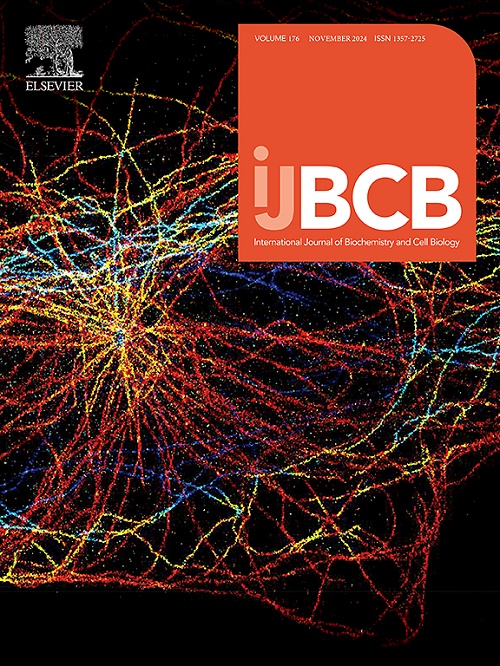PIAS1 S510G variant acts as a genetic modifier of spinocerebellar ataxia type 3 by selectively impairing mutant ataxin-3 proteostasis
IF 3.4
3区 生物学
Q2 BIOCHEMISTRY & MOLECULAR BIOLOGY
International Journal of Biochemistry & Cell Biology
Pub Date : 2024-09-16
DOI:10.1016/j.biocel.2024.106662
引用次数: 0
Abstract
Dysregulated protein homeostasis, characterized by abnormal protein accumulation and aggregation, is a key contributor to the progression of neurodegenerative disorders such as Huntington's disease and spinocerebellar ataxia type 3 (SCA3). Previous studies have identified PIAS1 gene variants in patients with late-onset SCA3 and Huntington's disease. This study aims to elucidate the role of PIAS1 and its S510G variant in modulating the pathogenic mechanisms of SCA3. Through in vitro biochemical analyses and in vivo assays, we demonstrate that PIAS1 stabilizes both wild-type and mutant ataxin-3 (ATXN3). The PIAS1 S510G variant, however, selectively reduces the stability and SUMOylation of mutant ATXN3, thereby decreasing its aggregation and toxicity while maintaining the stability of wild-type ATXN3. This effect is mediated by a weakened interaction with the SUMO-conjugating enzyme UBC9 in the presence of mutant ATXN3. In Drosophila models, downregulation of dPIAS1 resulted in reduced levels of mutant ATXN3 and alleviated associated phenotypes, including retinal degeneration and motor dysfunction. Our findings suggest that the PIAS1 S510G variant acts as a genetic modifier of SCA3, highlighting the potential of targeting SUMOylation as a therapeutic strategy for this disease.
PIAS1 S510G变体通过选择性损害突变型共济失调蛋白-3的蛋白稳态,成为脊髓小脑共济失调3型的遗传修饰因子。
以蛋白质异常积累和聚集为特征的蛋白质平衡失调是亨廷顿氏病和脊髓小脑共济失调 3 型(SCA3)等神经退行性疾病恶化的关键因素。先前的研究已在晚发性 SCA3 和亨廷顿病患者中发现了 PIAS1 基因变异。本研究旨在阐明PIAS1及其S510G变体在调节SCA3致病机制中的作用。通过体外生化分析和体内试验,我们证明了 PIAS1 可稳定野生型和突变型共济失调蛋白-3(ATXN3)。然而,PIAS1 S510G 变体会选择性地降低突变体 ATXN3 的稳定性和 SUMOylation,从而降低其聚集性和毒性,同时保持野生型 ATXN3 的稳定性。在突变型 ATXN3 存在的情况下,与 SUMO 结合酶 UBC9 的相互作用减弱,从而产生了这种效应。在果蝇模型中,下调 dPIAS1 可降低突变型 ATXN3 的水平,并减轻相关表型,包括视网膜退化和运动功能障碍。我们的研究结果表明,PIAS1 S510G变体是SCA3的遗传修饰因子,突出了靶向SUMO酰化作为该疾病治疗策略的潜力。
本文章由计算机程序翻译,如有差异,请以英文原文为准。
求助全文
约1分钟内获得全文
求助全文
来源期刊
CiteScore
8.10
自引率
0.00%
发文量
124
审稿时长
19 days
期刊介绍:
IJBCB publishes original research articles, invited reviews and in-focus articles in all areas of cell and molecular biology and biomedical research.
Topics of interest include, but are not limited to:
-Mechanistic studies of cells, cell organelles, sub-cellular molecular pathways and metabolism
-Novel insights into disease pathogenesis
-Nanotechnology with implication to biological and medical processes
-Genomics and bioinformatics

 求助内容:
求助内容: 应助结果提醒方式:
应助结果提醒方式:


